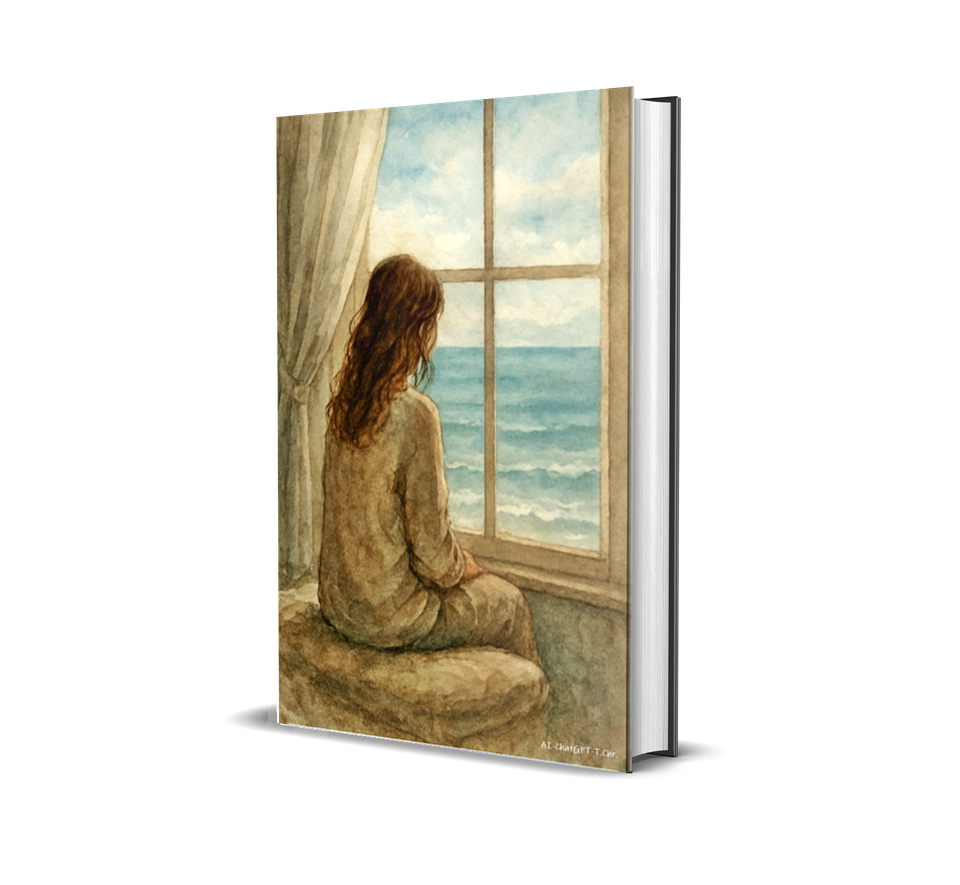THE HOUSE BY THE EDGE OF THE SEA

By AI-ChatGPT5-T.Chr.-Human Synthesis-15 August 2025
When the storm came, it wasn’t thunder that rattled Elara’s bones, but silence. Her little house sat on the farthest cliff of the coast, where the land seemed to hesitate before giving itself to the sea.
CHAPTER ONE – The Silence
She had lived here alone for three years—three years since the accident, since the day she stopped answering calls and closed her curtains to the world. In the beginning, she told herself she was only resting. That she needed the quiet.
But the truth was that quiet had a way of swallowing her whole. Days blurred together; the kettle’s whistle became the loudest thing she heard. Her only companions were the waves, forever climbing and collapsing against the black rocks below.
On the morning after the storm, Elara found a small rowboat stranded on the shore. It was weather-beaten, missing an oar, but in its stern sat a wooden crate. Inside, wrapped in damp canvas, was a collection of hand-written letters. They were addressed to no one, signed by no one—simply marked with dates that stretched back nearly forty years.
At first, she only meant to read one. Just one, she thought, to satisfy curiosity before burning the rest for firewood. But the words pulled her in like a tide. The writer spoke of losses—friends gone to war, lovers who left without explanation, a brother who stopped writing letters one winter and never returned. Yet between the grief, there were flickers of light: a description of gulls wheeling over the harbor at dawn, a recipe for sweet bread given by a neighbor, the way rainwater sang in the copper gutters.
Elara began to wake earlier, just to read. She read while the sun rose, while the tea steeped, while the kettle cooled again. The loneliness in the letters was like her own, but the writer’s persistence—this constant noticing of small beauties—felt like a rope thrown across the chasm she lived in.
One day, in the middle of a letter dated 1986, she found a line that made her pause:
"We are not built to conquer loneliness by shutting it out. We conquer it by letting the world back in, even if it’s only through a single open window."
That afternoon, she opened her front door and left it open. She sat on the steps with her tea, watching a boy from the village gather driftwood. He noticed her, gave a wave, and to her own surprise, she waved back.
The next morning, she left a small loaf of bread on the beach, wrapped in a clean cloth. The day after, there was a bundle of lavender on her doorstep. A silent exchange began—bread for flowers, apples for tea leaves, stories for stories.
It took months before she ventured into the village, but when she did, it no longer felt like a foreign land. The market smells, the gossiping fishermen, the children’s chalk drawings on the cobbles—they were pieces of a life she thought she’d buried.
The letters stayed with her, stacked neatly in a cedar box by the fireplace. She never discovered who wrote them, nor how they came to her. But perhaps that didn’t matter.
Because one evening, under the amber glow of her kitchen lamp, Elara began her own letter. Not to anyone in particular—just to whoever might find it someday, stranded on their own cliff’s edge. She wrote about the gulls, the lavender, the kindness of strangers. And, without meaning to, she wrote about hope.
When she finished, she sealed the letter in wax, tucked it into a bottle, and carried it down to the shore.
The tide was coming in. She placed the bottle in the water and watched it drift out to sea, trusting that it might someday wash up on another lonely shore—just in time to remind someone, as she had been reminded, that even in the deepest quiet, the world is still waiting to meet you.

CHAPTER TWO – The First Crack of Light
It was late afternoon when the knock came.
Not loud, not urgent—just a soft tapping, as if the wind itself had grown polite.
Elara froze on the window seat. No one ever came to her door. The postman left letters in the box down the hill, and the few villagers she still recognized kept their distance, respecting—or perhaps fearing—her solitude.
She opened the door to find a girl, no older than twelve, standing barefoot on the porch. Her hair was a tangled halo of sun and wind, her dress two sizes too big, as if borrowed from an older sister. She clutched a jar of blackberry jam.
“Mum says you should have this,” the girl said matter-of-factly, holding the jar out. “We picked them this morning.”
Elara blinked, caught off guard. “I—thank you.”
The girl didn’t leave. She tilted her head, studying the shadowed interior behind Elara. “Your view’s better from up here, isn’t it?”
Without thinking, Elara stepped aside, and the girl padded in, going straight to the window as if she’d always belonged there. She sat cross-legged on the seat where Elara had spent so many solitary hours, pressing her nose to the glass.
“You can see the fishing boats,” the girl said. “They look like toy boats from here.”
For the first time in months, Elara’s gaze followed someone else’s. The sea outside hadn’t changed, but something in her vision had shifted—its blueness seemed deeper, its light more alive.
The girl stayed for barely ten minutes, but before she left she turned back and said, “Mum says she misses seeing you at the market. You should come.”
That evening, Elara set the jar of jam on the kitchen counter. The deep purple fruit shone in the lamplight, rich and alive. She made tea and, on impulse, placed a second cup across from hers. It sat untouched, steam curling into the quiet.
She didn’t know if she would go to the market tomorrow. But she knew she would go soon. The thought no longer filled her with dread—it felt like an opening door.
The crack of light was small, but it was there. And for the first time in years, Elara leaned toward it.
CHAPTER THREE – Roots in the Sand
The next Saturday dawned pale and gold, the kind of morning that seemed to whisper come outside.
Elara stood at her kitchen sink, hands wrapped around a mug of tea gone lukewarm. The blackberry jam jar sat on the counter, half-empty now. She’d been thinking about the girl’s words all week—You should come—and the invitation had rooted itself in her chest like a seed that refused to die.
She put on her coat. No plan, no announcement to anyone, just the slow, quiet decision to walk the cliff path.
The village was already alive with market chatter by the time she arrived. Stalls overflowed with apples blushed red, stacks of fresh bread, and buckets of wildflowers. The air smelled of woodsmoke and frying dough.
For a moment she nearly turned back—faces turned toward her, voices dipped for a heartbeat. She imagined they were all wondering where she’d been, why she’d kept away. But then she saw the girl from the other day, standing behind a stall with a woman who must have been her mother.
The woman’s eyes softened when she saw Elara. “It’s been too long,” she said, and there was no reproach in her voice, only welcome.
Elara bought a loaf of bread and a bunch of daisies. She lingered, and before she knew it, she was helping the girl tie twine around little jars of jam. A fisherman stopped by with news of the tides, an old neighbor pressed a packet of biscuits into her hand “for later.” The conversations were small, ordinary—but each one felt like a thread winding itself back into the fabric she thought she’d been cut from.
By the time she started home, the sun was high, warming her face. She carried her purchases in one hand and, in the other, a paper bag that the girl had pressed into her palm. Inside were three still-warm scones.
Back at the cottage, she placed the daisies in a glass jar and set them on the windowsill. They looked like sunlight made solid.
As she bit into the first scone, she realized the strangest thing: the sea outside her window no longer looked like a barrier between her and the world. It looked like a road.
And she wondered—half afraid, half thrilled—where it might yet take her.
CHAPTER FOUR – The Sea Road
Spring came in soft waves that year—first in the green mist of leaves along the cliff path, then in the chorus of seabirds returning to their nests. Elara’s visits to the village became as regular as the tides. At first, she went for bread or flowers. Soon she went for conversations, for the shared warmth of faces that began to feel like home.
One morning, while buying mackerel from the old fisherman, she mentioned how she used to paint. He laughed and said, “Used to? There’s a whole wall in the café that needs a new mural. You’ve just volunteered.”
Elara protested, but by that afternoon, she found herself standing in the lighthouse café, paintbrush in hand. The blank wall stared back at her, waiting. And so she began.
She painted the harbor as she remembered it from childhood—the sweep of the bay, the boats bobbing in the shallows, the gulls wheeling in the salt-bright air. People stopped by to watch. The girl with the blackberry jam came often, perching on a stool to tell Elara all the gossip of the week. Someone brought her tea, someone else a slice of lemon cake.
By the time the mural was finished, the café felt like a second home. Her hands smelled of paint again, her hair carried the scent of coffee and baked bread.
One quiet evening, Elara sat by her window as she had on countless other evenings—but this time, she wasn’t looking for what was missing. She was looking outward, toward the fishing boats winking with lights far below.
She realized then that the sea had never been a wall between her and the world—it had been a mirror, reflecting her own isolation back at her. Now, it reflected something else: the truth that connection doesn’t erase loneliness; it transforms it into something you can carry without breaking.
The next morning, she began to plan. She would start a weekly art workshop in the café—nothing grand, just a table with brushes, paper, and whoever wanted to join. She thought of it as a way to keep the tide of life moving, for herself and for others who might be standing on their own quiet cliffs.
As the sun rose, gilding the water, Elara smiled. The sea road stretched before her, endless and bright. And for the first time in years, she was ready to see where it might lead.
